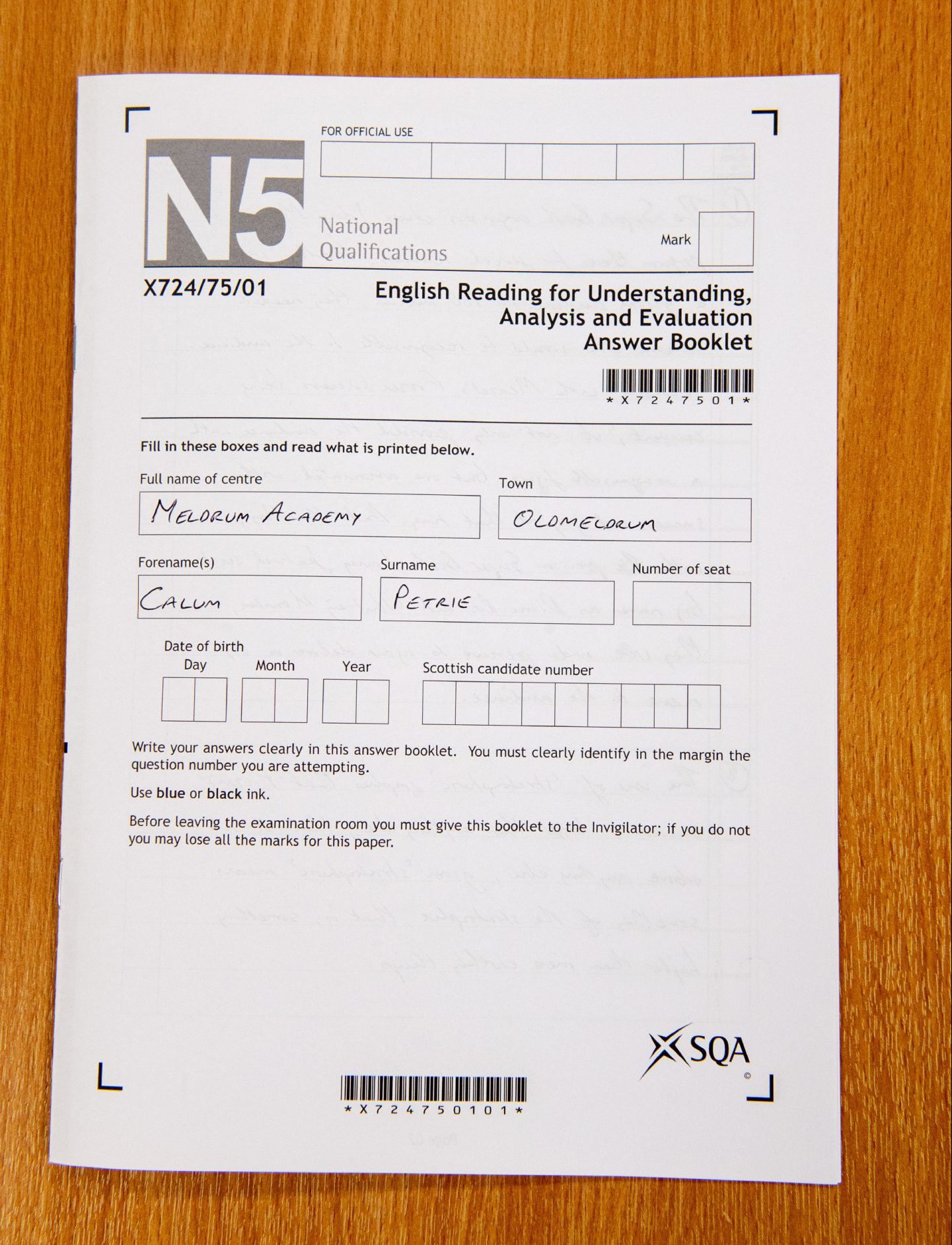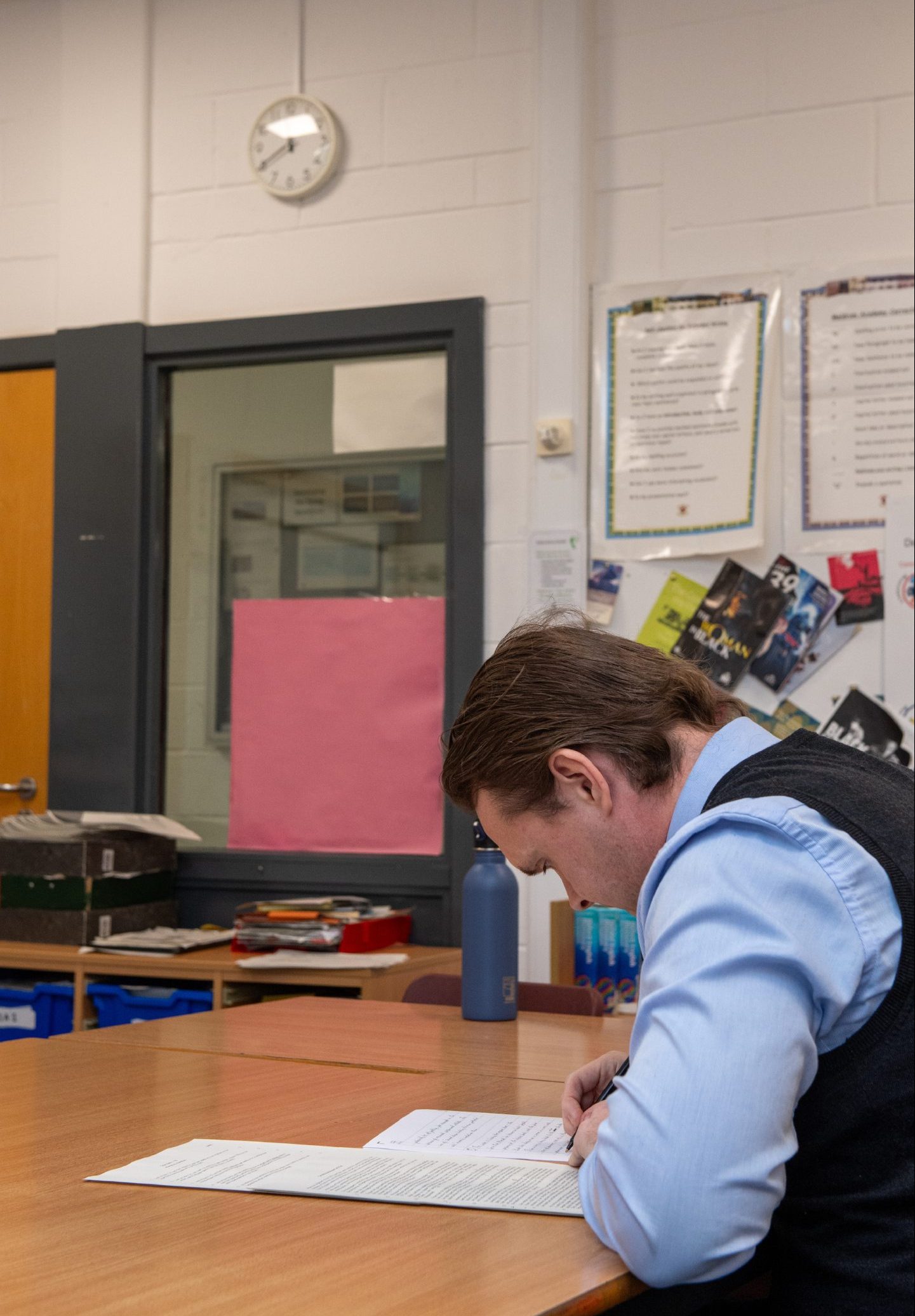
Are school exams easier these days?
It’s a line we hear often, together with ‘grade inflation’.
Thousands of pupils across the north and north-east are preparing for prelims in January.
It’s not much help for them to be told ‘it was harder in my day’, as they struggle through revision at a time of year when most are enjoying some downtime.
So I decided to put it to the test.
I sat Standard Grade English in 2000, achieving a 1. For younger readers, Standard Grades are what National 5s used to be, and a 1 is equivalent to an A.
But how relevant is that 23 years later?
National 5 English: Easy for a journalist…right?
Older, and supposedly wiser, I visited Meldrum Academy where I sat a National 5 English exam, under the watchful eye of English teacher John Glendinning.
Exam conditions were recreated as much as possible. I had my invigilator, my phone was taken away, my starting time logged, and the exam paper unseen.
I sat the RUAE (Reading for Understanding, Analysis and Evaluation) part of National 5 English. Although a past paper, it is no longer available online so, no, there was no sneaky peaking beforehand.
Naively, I thought I’d spend some time preparing, but with three kids, a full-time job, and it being December…no.
Thankfully I’d been spared the Critical Reading paper, which together with RUAE forms National 5 English.
The Critical Reading paper poses questions on a book or poem that has been studied in class, whereas the RUAE part involves analysing a piece of text which no-one has seen until the day.
In my exam, it turned out to be a 1,000-word Times article about actress and singer Idina Menzel, specifically her role voicing Elsa in Frozen.
Remember that ‘Let It Go’ song your child sang on repeat for about two years? That’s her.
My oldest is now at secondary school and I remember them going through a pretty intense Frozen phase as a young child. Not for a moment did I think I’d be back there in such pressurised circumstances.
I’d never even heard of Idina Menzel until opening the exam.
My old friend time management, or lack of it
A bad omen? Certainly, the subject of the text was far from my comfort zone.
If there’s one thing I hate, it’s ‘celebrities’ and that whole world. I was ready for a passage of Hardy or Hemingway, not Super Bowl half-time entertainment and Oscar ceremonies.
Anyway, time – or lack of it – fairly acts as a spur to get on with it. I had one hour to answer nine questions.
The questions felt fairly straightforward, even if with a few of them I wasn’t fully confident I’d understood exactly what the examiner was looking for.
What was tricky was the time management element, and this is something which I can remember from my exam-sitting schooldays.
There was a distinct sense of déjà vu as I glanced at my watch and realized I needed to move on to the next question, despite having not answered the previous one as fully as I’d have liked.
Which did get me thinking about whether exams really prepare kids for the world of work.
As a journalist I work to deadlines, but ultimately, I’m given the time it takes to make sure the job is done properly, that I’ve done a piece of work justice. I’m not sure how much of my stuff would see the light of day if someone stood over me with a stopwatch and said “Go!”
There’s pressure, and there’s the National 5 English exam
Anyway, I managed to answer all nine questions with a minute to spare, and there was more déjà vu as I felt the relief coursing through my veins at handing my papers over.
No matter what the exam, writing seven sides of A4 in an hour while not dropping your concentration for a moment is draining.
I distinctly remember that feeling of lightness for the rest of the day after an exam, no matter how I felt I had done. Just the fact it was over.
Also, this being the digital age, I’m not used to writing by hand so much, so I got writer’s cramp which was still with me when I got back to the office. Come to think of it, I think the last time I got writer’s cramp was at school.
I hoped John would be able to read my answers, as there was a distinct deterioration in my handwriting towards the end of the exam.
How did I think I’d done? I’m notoriously poor at predicting my own success or failure.
I remember being close to 100% convinced I’d failed my driving test, before being told I’d sailed it.
Then there was the marketing exam at university which I was convinced I’d cinched, only to find out I’d passed by the skin of my teeth.
Just put me out of my misery
My guess was that I’d passed with a decent grade, but I still felt a weight on my shoulders.
I was well aware that a poor showing would leave the entire P&J open to social media schadenfreude.
“Ha, P&J journos can’t even pass S4 exams!”
I didn’t have long to suffer, as John rang the following day with his verdict.
Reader, I passed.
Not with distinction, but with 21 out of 30 John told me he’d be expecting a ‘high B’ for the full National 5 English. Or, “with a fair wind”, an A.
“Given your verbosity I’d be very hopeful that your folio would score well – anyone would think you do something with words for a living…”
John thought I’d set out my answers to the ‘In your own words…’ questions well.
In others, my “knowledge of language came to the fore”.
I also did a good job of showing how the passage linked ideas.
However, I did get my knuckles rapped for a few things.
Oh dear: Wrong layout, lifted quotations, and not getting to the point
My suspicion that I hadn’t fully grasped some of the questions was sadly proven correct. “You need to watch out for decoding the question in focus,” said John.
He cited a question where I’d been asked what Disney are like as an organisation. I’d written more about their products than the company itself.
In more than one answer, I lifted quotations direct from the passage, which I’m told is a big no-no.
With another, I used the “wrong layout” in my answer.
I was also told I needed to “get to the point more swiftly” in several of my answers. And here’s me thinking I’d had to rush some of my answers without explaining them fully enough.
“You tend to go round the houses a little before finally getting to the point”, said John.
I expect my wife would say the same.
Kudos to today’s kids, exams are still tough
So are school exams easier these days?
Well, I’ve spent almost 20 years working with the written word, in journalism and in publishing. It’s the only real skill I have.
So the fact that I scored only 21/30, missing out on an A in an exam designed for 15-year-olds, tells me that school exams still represent a stiff challenge.
And John concurs, calling National 5 a “robust qualification” that gives pupils a thorough examination of their language skills, albeit using texts more relevant to the present day than the likes of Shakespeare, which now tends to be introduced at Higher.
Kids, don’t let your parents tell you how much harder it was in their day.
And best of luck in the prelims.







Conversation